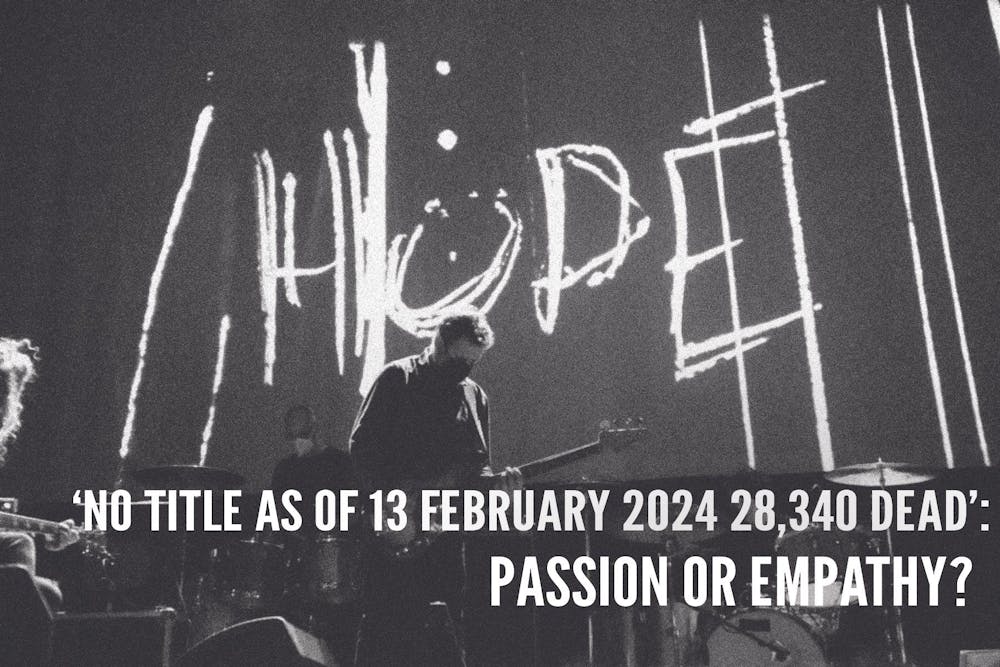Back in 10th grade, I listened to “Lift Your Skinny Fists Like Antennas To Heaven”(LYSF) by Godspeed You! Black Emperor (GYBE) for the first time. It was also the first time I listened to anything musically powerful enough to induce a rare moment of being completely moved. In the first track, “Storm,” you feel yourself slowly ascending while being sonically blasted by a platoon of instruments. GYBE induces a nervous anticipation as the wall of sound lifts you higher and higher until, suddenly, the music mellows and the track lowers you onto a plane of ambient bliss. From the non-dynamic parts to the field recordings, this rollercoaster continues for the duration of the album in various forms. While I don't get nearly the same amount of enjoyment out of it as I did when I listened to it originally, I still have an appreciation for the piece.
Aside from the album itself, the title for LYSF is eye-catching; moreover, it reflects the music. The title hints that the album has the capacity to radiate some experience of the divine in a non-megalomaniacal, almost humble, manner. It moreover not only complements the music but accurately describes what the music is clearly attempting to convey.
24 years later, after LYSF, GYBE released “NO TITLE AS OF 13 FEBRUARY 2024 28,340 DEAD.” The title references the number of Palestinian deaths from the Israel-Hamas war at the time of publishing. I did not like the album, and ended up finding only a few parts enjoyable. I liked the finale of the second song, “BABYS IN A THUNDERCLOUD,” and parts of the song “RAINDROPS CAST IN LEAD” weren't all bad. Aside from those brief moments, I felt like it was nothing substantial. The texture felt dry, and there seemed to be a complete lack of novel material. It seemed like the band was still doing the exact same thing 24 years later.
As for whether the music seemed reasonably affected by its subject matter, it was clear after listening to the music that the band hasn't been emotionally taken by the death of the Palestinians in any eulogistic sense, nor is it riding any wave of fury directed towards the Israeli government. If anything, you could characterize the album as powered by noble yet artistically vacant empathy.
Like LYSF, the title accurately illustrates the band's intent. Unlike LYSF, the album was written as a political flier first and as an album intended for artistic merit second.
My opinion on this album seems to be a minority one. Music rating sites such as Rate My Music rate it on par with their early masterpieces. Pitchfork gave it a 7.8, and almost all other major music magazines didn't give the album anything less than four out of five stars. Some sites even proclaimed that this album was a clear sign of redemption from their other recent disappointing works.
I strongly believe that the reason for all this unwarranted love is because the conflict arouses so much justified passion in listeners, especially the listeners of GYBE. Furthermore, I have the feeling that the quality of this album was assessed not by the music itself but purely by the noble intentions of the title. More evidence for my point is found in the charmingly principled Youtube music reviewer, Anthony Fantano, who refused to rate the album, giving GYBE's project a badge of honor and insinuating it's a piece immune to criticism. His calculation? Better to avoid giving an unworthy album a high score than sacrifice the integrity of your rating system.
I recognize that most of the review is about reactions and the artistically damaging politics involved. A perfectly valid question some of you might be having is: Where is the review of the music? Aside from believing that giving my own adjectives to describe the music is boring for the reader, and redundant, the album doesn't have a lot to comment on. Despite it being 50 minutes of music, most of the album is repetitive droning with some crescendos. There is very little music to apply meaningful review beyond the sentences I devoted to it in the third paragraph.
One could argue, in response to my complaints, that I may have listened to the album passively or with ambivalence. Furthermore, one could suggest the way to implement political conflicts into music or art without damaging the album's purity could be by encouraging the listener to contemplate the artist's political statement as the album plays. I decided to heed this hypothetical advice when I listened to it for a second time. I played “GREY RUBBLE — GREEN SHOOTS” while envisioning a scene from Gaza. I concede that this exercise did arouse empathy and furthermore served as a mental filmography to the music. But in the end, as it is with any piece of music, what you hear is what you hear, and nothing I could attach to the work through my own imagination could redeem this album to be anything greater than a disappointing wall of banal sound.










